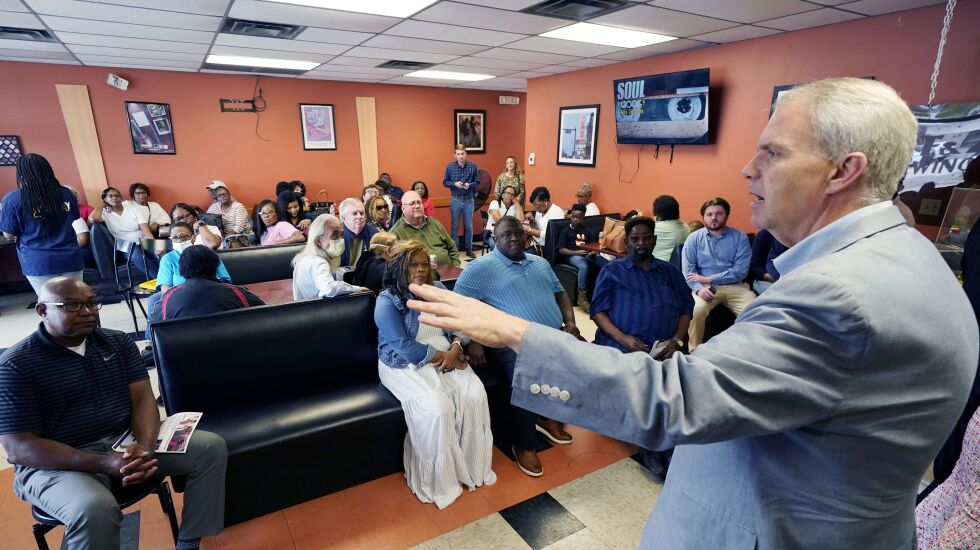
A year in which there are only three races for governor’s seats, all in the Deep South, wouldn’t normally create a lot of political speculation. Kentucky’s popular Democratic incumbent may have a tough race, and chalking up Louisiana and its neighbor to the east to a Republican would be typical conventional wisdom.
But “Mississippi Miracle” may well become the catch phrase of this election season. Brandon Presley is making a strong bid to become the first Democratic elected governor in the Magnolia State this century.
Presley (yes, Elvis from Tupelo is a cousin) has won a seat on the state’s Public Service Commission four times, where he’s opposed a huge coal-fired power plant and a proposal to dump nuclear waste in Mississippi and fought to expand internet access in rural areas.
He’s hard to pin as a typical Democrat. He lowered taxes and balanced budgets as a mayor, endorsed George W. Bush in the 2004 presidential election and describes himself as a pro-life Christian (which he is quick to note demands supporting health care, education and seniors as well).
Presley has a powerful personal story that reaches well beyond his kinship with the King of Rock and Roll. He was raised by a single mom who worked in a garment factory after his father was murdered. He’s told poor and working-class voters they should see their own names on the ballot when they see his.
Nettleton, the town of about 2,000 people in the northeastern Mississippi that Presley hails from and where he first became mayor at age 23, is split — about 60% white and 40% Black, like the state as a whole, but has a median income $10,000 below the median in one of the poorest states in the country.
It’s no surprise Presley is campaigning on issues that matter most to those voters. He responded to Gov. Tate Reeves’ State of the State address outside a shuttered rural hospital to highlight his $1 billion Medicaid expansion plan, which he says will improve health care provided to low-income residents and save nearly 40 Mississippi hospitals at risk of closing.
Reeves is unpopular even among his party’s voters. Six in 10 voters in a recent poll, including one-third of Republicans and two-thirds of Independents, said they want “someone else” to be governor. While he’s campaigning on a raise he gave educators, the teachers union has endorsed Presley.
The incumbent has been tied to a scandal in which up to $94 million in welfare funds were diverted to pet projects of the state’s most powerful, while many families in need were being denied $170 a month in assistance. It’s a particularly salient issue at this moment when Mississippi and other states are beginning to seek and spend hundreds of billions in federal dollars to build infrastructure and create clean energy jobs.
Presley will need a big turnout from the 38% of Mississippi voters who are Black. He’s not well-known in Jackson and the southern end of the state, where most of them live. He had the endorsement of U.S. Rep. Bennie Thompson, the state’s only Black member of Congress, almost immediately after announcing his campaign (the last Democrat who ran did not).
Black and low-income voters would gain much from Medicaid expansion and Presley’s plan to cut Mississippi’s regressive 7% grocery tax. Having suffered with a Republican leading the state a decade ago, they’d have a champion as governor as legislative and Congressional districts are redrawn in response to the census this time around.
Even more broadly, a Presley victory and his economic proposals might begin to shift what’s been a historical migration pattern for Blacks out of the state up the Mississippi River and westward to California. When I was a young organizer in Mississippi in the 1990s, a mentor who had helped build the state’s public health clinics during the Kennedy and Johnson years told me there were more Black doctors who’d been born in Mississippi living in Los Angeles County than in the entire state of Mississippi.
No state can thrive indefinitely letting its best and brightest look for opportunity elsewhere. Mississippi may decide to turn off that spigot in November.
Ben Jealous is executive director of the Sierra Club and a professor of practice at the University of Pennsylvania.
Send letters to letters@suntimes.com







